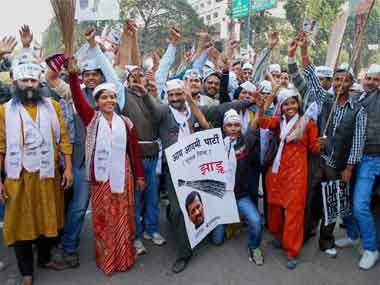New Delhi: Eighty-three is just a number, it’s no age to stop. Ask Muniswamy. His wiry, rather fragile, frame belies his age as he steps out of the platform after the end of a long train journey from Chennai. He is here to campaign for the Aam Aadmi Party as a volunteer. You ask him why is he here and get this reply: “I was actively involved in the freedom movement as a child. Since then I’ve seen the ups and downs in politics and the parties getting more and more corrupt. But, today, I see the possibility of true swaraj in the AAP.” Part of a 200-strong contingent from Tamil Nadu, Muniswamy, will stay in Delhi till the campaigning is over. [caption id=“attachment_2073487” align=“alignleft” width=“380”]  PTI[/caption] There are hundreds like him who are either already in Delhi or on the way to the national capital to assist AAP in the last phase of the campaign. Volunteers from even non-Hindi speaking states like Karnataka, Andhra, Telangana, Kerala, West Bengal, Odisha and Maharashtra have fanned out in the city to convince people belonging to their respective states to vote for the party. The big fight is on now; it’s BJP’s star power vs AAP’s mass power. “We all are here to give a push to the campaign. It’s a battery of dedicated volunteers, committed to bringing a change in the existing system. To them, it’s like second freedom movement and this motivates them to come from such a long distance and work,” says Christina Swamy, member, national executive of the AAP and leader of the Tamil group. All these volunteers from across the country pay their train fares and consider it a voluntary service. But, what motivates them to do so? “AAP has brought hope. It has shown how even a common man without any political background can be a part of mainstream politics,” says Pralay Sahoo, who has come from Puri (Odisha), with a group of six. Unlike, the stars and political heavyweights campaigning for the contesting candidates in BJP and Congress, the AAP has a large base of foot-soldiers and training is being provided to make them active volunteers. Christina, Muniswamy or Shraboni are not the first-timers. They were active even during 2013 election in Delhi, and this time they are here to win back their lost turf. “Our volunteers from other states have willingly come to Delhi to contribute their services during the election. After training, we allocate specific areas like bus stands, shopping complexes, markets, residential areas, etc to them to work. On the basis of their mother tongue, they are deputed in those localities or communities, where they communicate with people with a similar background and tell them about the party and its agenda,” shares Pankaj Gupta, one of the key strategists of AAP. A group of volunteers from Chennai is now actively making contacts and holding meetings in small groups with individuals and Tamil associations in 13 Assembly constituencies including the urban seat like RK Puram, and in rural pockets like Munirka, Mochigaon, Basant, Mohammadpur, etc. “I’m helping my seniors and trying to meet as many Tamil workers’ families as possible before the election date,” says 18-year-old Gopalakrishnan, volunteering in a pocket comprising Tamil labourers at Kalkaji. Out of nearly 30 lakh South Indian population in Delhi, 14 lakh are Tamils. “For more than six decades, the Tamilians have contributed to the city in all spheres but representation in Delhi has been out of reach. They have been used only as vote banks. Now we look forward to our share of representation in making Delhi a better place to live in. AAP has recognized us as potential voters,” says Radhakrishnan TR Aiyyer, office-bearer of Tamil association, Mudal Padi. Similarly, Bengali volunteers who have come from outside are aiming Bengali-dominated localities like Chittaranjan Park, where more than 30,000 Bengalis reside. “It’s not just any other election, but a fight against corruption for us. We can’t afford to lose this election. It’s AAP that introduced a new kind of politics, unlike the Congress and the BJP, who got ample opportunities, but failed to deliver and they practiced the same brand of politics,” says Bangalore-based Shraboni Guha, who has come to be a part of AAP’s campaign along with 70 other volunteers. In a bid to connect with the middle-class Bengali voters, the AAP organised a Jan Sabha (public meet) by Yogendra Yadav along with the incumbent MLA Saurabh Bhardwaj that attracted more than 500 people at CR Park’s Market No 2. “The aim of this public meet was to connect with middle and upper middle class voters of this area, and we have been successful in it. Besides, a large number of volunteers have come from West Bengal, Odisha and other states for door-to-door campaigning and connecting with Bengali voters in pockets like CR Park, Gole Market area, etc,” says Anup Tagore, AAP’s coordinator, CR Park-Alaknanda.
Unlike, the stars and political heavyweights campaigning for the contesting candidates in BJP and Congress, the AAP has a large base of foot-soldiers and training is being provided to make them active volunteers.
Advertisement
End of Article


)
)
)
)
)
)
)
)
)



